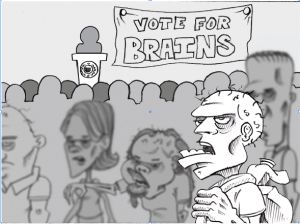For young voters, it might be their first attempt to cast votes and shape the course of this nation; it can often be an overwhelming experience.
 Mark Livingston
Mark Livingston
– Staff Writer –
It’s time for some football, but not what you may think. This year the United States citizens have the opportunity to vote for some pending propositions on the ballot and congressional members in the state and national elections. Many use the proverbial football to push their agendas.
For young voters, it might be their first attempt to cast votes and shape the course of this nation; it can often be an overwhelming experience.
Television advertisements demonize both candidates such as “He did this,” “She voted for that,” etc. It seems like voters have to decide who is the least terrible person. For most young voters, they still have hope, hope that they can change the establishment by voting a certain direction.
Young voters are led to believe they are smarter than the previous generations and this is exactly what politicians would like.
Former Vice President Al Gore said, “There are some things about our world that you know that older people don’t know.” This is an example of a politician pandering to the young voters in order to harvest their vote. It happens every election cycle.
And so the youth is duped into a reliable vote for a professional politician. It’s very easy to massage the young voter’s mentality, which, almost always, will fall for this pandering.
“Oh, you’re so smart, in fact you more keen to the problems that plague this world. I’m willing to listen to you and change this reputation of politics as usual.” So, with a wink and a nudge they begin picking out the color for the walls of their new office, never to do anything they say, yet spit the same rhetoric two years later during the next election cycle.
Old people are dumb and young people are smart. Until one day when those young reliable voters become independent thinkers, who investigate the issues and holds their representatives to their campaign pledges.
Puppy mills, who likes puppy mills? Who wouldn’t cast a vote against puppy mills? Proposition B, in Missouri, is just another example of politicians using a cause as their football. After all who needs to investigate any proposition, for which its main purpose is to ban puppy mills?
The Humane Society of the United States or HSUS is not the same as the Humane Society of America.
Proponents of the proposition claim the HSUS has accumulated more than $162 million in assets, yet donates less than one percent of that to helping animals.
Ninety nine percent of their budget goes to lobbyists, pensions, salaries and infomercials to raise more money.
The HSUS is not affiliated with animal shelters; they do not promote spaying or neutering, nor do they take in stray, neglected or abused pets.
If you give $19 a month to their organization, $1.03 will actually make it to a pet shelter throughout an entire year.
This group has brought the puppy mill issue to the ballot box. The bill touts itself as an anti-puppy mill law; however, this law could potentially end the ability for most to own a pet, as most breeders will be strong armed out of the business, thus lowering supply and increasing costs.
The HSUS has already passed similar laws in Florida and California destroying the pork and chicken egg industry in those states.
The law would also create a Class C misdemeanor for a breeder to have a piece of food in a water bowl, a cobweb in a corner or a scratch on a painted surface.
The HSUS president has said, “We are going to use the ballot box and the democratic process to stop all hunting in the United Sates,” all this detailed by www.alliancefortruth.com.
In life and especially in politics, if it sounds too good to be true, it probably is.
Anti-puppy mill laws are already the law, instead of passing new restrictions, how about enforcing the ones already on the books.
When voting this November, don’t allow yourself to be used as the proverbial political football. Understand the system, understand the issues, understand the policies, and then vote. But don’t vote blindly, after all that is what some politicians want.










